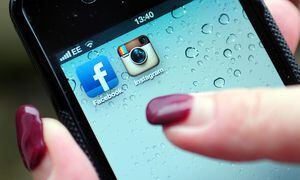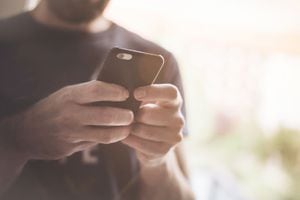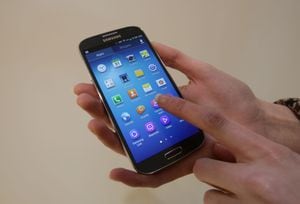Are young people sleepwalking into life of phone addiction?
Comedian Jimmy Fallon wryly observed that while 64 per cent of Americans owned a smartphone, 100 per cent of smartphones owned an American.

And new research suggests that for millions of young adults, there may be more truth in that than we realised.
A study by King's College London found that nearly four in 10 people aged 18-30 showed symptoms of addictive behaviour as far as their smartphone is concerned.
It will seem a strange phenomenon to many. Fifteen years ago, smartphones barely existed, other than as the work tool of the kind of nouveau-riche businessman who a couple of decades earlier might have been barking orders into a huge mobile phone.
But the introduction of the iPhone in 2007 brought portable connectivity into the reach of millions, and for the generation which has grown up with internet access in their pocket, the idea of being offline seems tantamount to living without electricity or running water.
They might rarely use it to make phone calls, but for today's young adults the smartphone is at the centre of their lives. They keep in touch with their friends via messaging services, they use it to play games, and almost everything they do will be documented on social media.

But while for most this will be a bit of harmless fun or, at worst, a passing phase, for a growing number of young people a dependency on their mobile phone can have a disturbing effect on their wellbeing.
The King's College study found that 39 per cent of adults aged 30 and under reported symptoms such as losing control over how long they spend on their phone, distress when they cannot access it, and neglecting other areas of their life.
While smartphone addiction is not formally recognised as a clinical diagnosis, there is now a recognised measure of the impact has on people's lives, which formed the basis of this study.
Samantha Sohn, lead author at King’s study, says as smartphones become an increasingly indispensable part of our daily lives, it is important to consider their impact in terms of dysfunctional use on the UK population.
And it seems one of the major effects of phone addiction is on sleep patterns.

The research found that 69 per cent of those showing signs of phone addiction reported poor sleep regardless of the time spent looking at their phone, compared to 57 per cent of those who did not have a phone addiction.
The sheer time spent on their phone is another factor. Approximately a quarter of those who showed signs of addiction used their phone for three hours a day, and a further 18.5 per cent said they used their device for more than five hours each day.
Dr Ben Carter, senior lecturer at the college's Institute of Psychiatry, Psychology & Neuroscience, says the study adds to the growing body of evidence that smartphone addiction has a negative impact on sleep. But, more disturbingly, it appears that the effect is still there, even if an 'addict' finds manages to curb their phone use.
“The association is still significant even after adjusting for daily screen time use," he says.

“Although daily length of smartphone use is an exposure of poor sleep, it is not the only determining factor and our findings demonstrate a validated smartphone addiction instrument offers greater explanation.
“It also shows that the impact of sleep quality and smartphone addiction is down to more than how long we are using our phones for. This could help clinicians when treating children and adults with sleeping difficulties about how they identify problematic usage.”
The study used survey responses from 1,043 people and matched their replies to the addiction scale tool, finding that 406 met the criteria for smartphone addiction.
In recent years, many major smartphone manufacturers have introduced features to their devices designed to reduce the impact of screen time on sleep, as well as tools that enable users to limit the amount of time they spend on their devices each day.
Addiction psychiatrist Dr Nicola Kalk argues that the study shows screen time is not the main indicator of harmful phone use.

“This study makes clear that it is features of behavioural addiction rather than exposure time that is predictive of smartphone-associated harm,” she says.
“It is particularly interesting that many respondents reported trying strategies to limit their smartphone use, and those who endorsed features of addiction had tried multiple strategies.”
Concerns over health costs associated with smartphone addiction has led to many handset manufacturers introducing new features to keep screen-time under control. Apple introduced its Screen Time feature to allow users to set limitations on how much they use their iPhone or iPad, while Google has also launched similar features to promote "digital wellness" on its Android platform.
Signs of addictive behaviour can include feeling anxious when the phone is left in another room, checking emails and social media in the middle of the night, and ignoring people around them because they are checking their phone.
There have been growing concerns that phone addiction has seen a sharp increase during lockdown, as normal face-to-face relationships have been replaced by digital communication.
Science journalist and self-identified tech addict Catherine Price decided to research the subject based on her own phone addiction, and wrote How To Break Up With Your Phone.
One of her tips on how to break the addiction is to pause for thought when you reach for your phone, and consider why you are doing it. She says applications which measure screen time use are also a useful tool in cutting down excessive use.
Price also recommends turning off all notifications, including those for email. If you are worried about missing a call or email from work or a family member, then put them on a special list so they alone have notifications. She also recommends deleting social media apps, saying that if you want to access such sites, only do so through a conventional browser.





